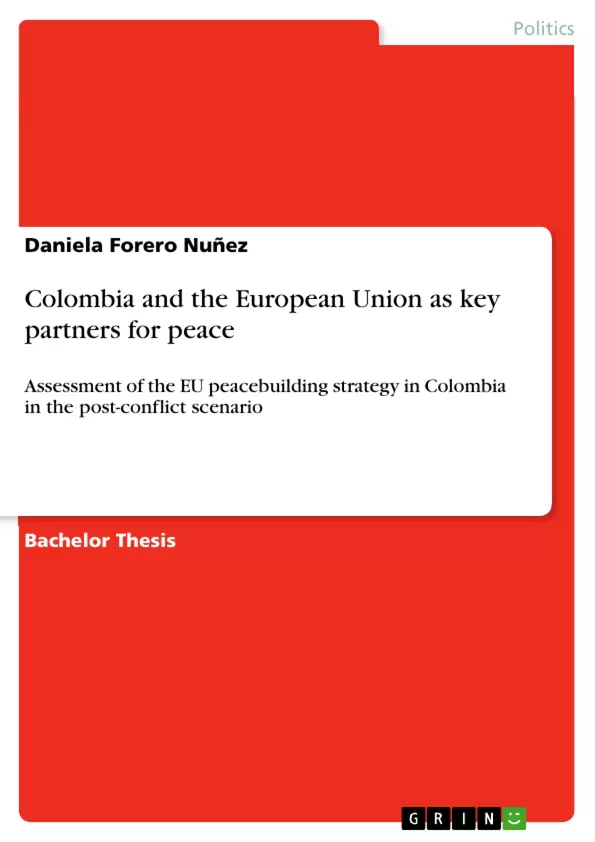Colombia’s long path towards peace was heavily marked by the signing of a peace agreement in 2016 that was supposed to officially put an end to the longest-running conflict in modern Latin America. Nevertheless, even after more than four years since that historic milestone, violence continues to plague the country, endangering the transition towards a real transformation. Although the conflict’s origin is complex and multicausal, some of its root causes, such as socioeconomic inequality, limited political participation and the State’s absence in several regions, remain unsettled.
This internal conflict does not stop at the Colombian border and rather places itself within an international context, bringing several actors of the international community together. Specifically, the European Union (EU) appears as one additional player that seeks to support the building of sustainable peace in the country by helping to tackle some of the structural causes of the conflict. In parallel, it should contribute to the implementation of the peace accords – which independently from its actual fulfillment – rely on a broad reconciliation and consensus-seeking process of major symbolism.
The European Trust Fund for Colombia (EUTF for Colombia) – established in December 2016 – embodies the EU’s aim to contribute to sustainable development in the long run. This premise builds the essence of the EU Development Policy. The following thesis attempts to examine the EU peacebuilding strategy in Colombia in the aftermath of the conflict. The main question guiding the research is: To what extent has the EUTF for Colombia contributed to the building of a just and sustainable peace in the country during the post-conflict era?
Inhaltsverzeichnis (Table of Contents)
- Introduction
- Introduction to the topic and research question
- State of research
- Methodology and structure of the study
- Theoretical framework
- John Lederach: Peacebuilding as conflict transformation and social reconciliation
- Research hypotheses
- The EU Development Policy's role in conflict resolution and post-conflict stabilization worldwide
- Key objectives and fundamental principles of the EU Development policy
- The EU Development Policy's legal and institutional framework
- The Development Cooperation Instrument (DCI) and the EU Trust Funds as financial instruments of peacebuilding
- Colombia's long path towards peace: from the roots causes to the current panorama
- Historical background and course of the Colombian internal armed conflict
- Retrospective review of the European engagement in Colombia
- Signing of the peace agreements of 2016: The end of the internal armed conflict?
- The post-conflict scenario: Implementation of the peace agreements of 2016
- General assessment of the EU peacebuilding strategy in Colombia during the post-conflict era
- The EU's grassroots approach to peacebuilding in Colombia
- Sustainable peace vs. security and defense
- Poor accountability and shared responsibility: A threat for lasting peace?
- Conclusion
- Empirical findings
- Theoretical implications
- Prospects for further research
Zielsetzung und Themenschwerpunkte (Objectives and Key Themes)
This bachelor thesis assesses the EU peacebuilding strategy in Colombia in the post-conflict scenario, focusing on the EU's role in the implementation of the 2016 peace agreements. The study aims to evaluate the effectiveness of the EU's approach to peacebuilding in Colombia and to identify the key challenges and opportunities for the EU to ensure sustainable peace in the country.- The EU's role in conflict resolution and post-conflict stabilization worldwide
- The EU's development policy and its legal and institutional framework
- The Colombian internal armed conflict and the peace agreements of 2016
- The EU's peacebuilding strategy in Colombia in the post-conflict scenario
- The challenges and opportunities for the EU to ensure sustainable peace in Colombia
Zusammenfassung der Kapitel (Chapter Summaries)
The first chapter provides an introduction to the topic and research question, outlining the state of research and the methodology used in the study. The second chapter presents the theoretical framework, drawing on John Lederach's concept of peacebuilding as conflict transformation and social reconciliation. The third chapter explores the EU Development Policy's role in conflict resolution and post-conflict stabilization worldwide, focusing on its key objectives, principles, and financial instruments. The fourth chapter delves into Colombia's long path towards peace, examining the historical background, the course of the internal armed conflict, and the signing of the 2016 peace agreements. This chapter also analyzes the post-conflict scenario, highlighting the challenges of implementing the peace agreements. The fifth chapter provides a general assessment of the EU peacebuilding strategy in Colombia during the post-conflict era, focusing on the EU's grassroots approach, the balance between sustainable peace and security, and the challenges of accountability and shared responsibility.Schlüsselwörter (Keywords)
This work explores the role of the European Union in peacebuilding and its impact on Colombia's post-conflict scenario. The analysis focuses on the EU's development policy, peacebuilding strategies, and their effectiveness in promoting sustainable peace in a post-conflict context. The study examines key themes such as the EU's grassroots approach, accountability and shared responsibility, the balance between security and sustainable peace, and the challenges of implementing peace agreements. This work utilizes concepts from peacebuilding theory, international development, and conflict resolution, drawing on empirical data and case studies to provide a comprehensive assessment of the EU's role in peacebuilding in Colombia.- Quote paper
- Daniela Forero Nuñez (Author), 2021, Colombia and the European Union as key partners for peace, Munich, GRIN Verlag, https://www.grin.com/document/1035644



